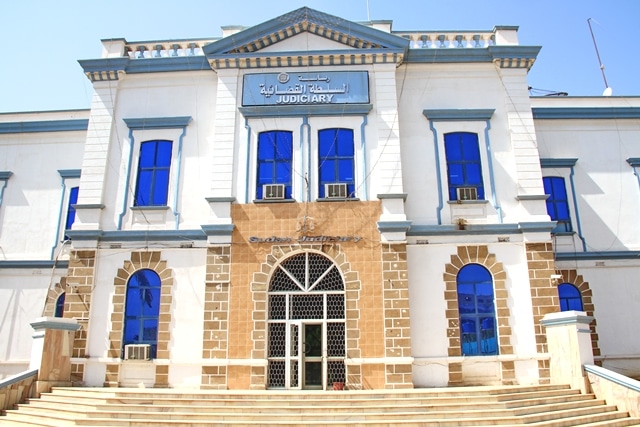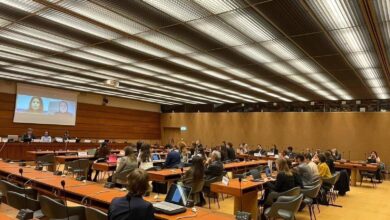Malicious Complaints Exploit “War Courts” and Tie the Hands of Sudanese Justice
Mashawir – Agencies

Since the outbreak of fighting between the Sudanese army and the Rapid Support Forces (RSF) on April 15, 2023, Sudan has witnessed summary trials and field executions across several regions. Many of these were based on malicious or retaliatory complaints, lacking basic guarantees of justice, while defendants were denied legal defense and civilians were tried in military courts — deepening victims’ suffering and widening the gap between international standards of justice and the harsh local reality.
In the city of Wad Madani, now under RSF control, Mohamed Radwan was arrested following a report filed by his neighbors accusing him of collaborating with the occupying forces. But his brother told a different story:
> “My brother Mohamed was not cooperating with the RSF. He was simply trapped in the city — we couldn’t leave because anyone who tried was either killed or kidnapped. He was referred to a military court without a lawyer and denied any chance to defend himself. We weren’t allowed to see him or even learn the details of the charges. Then, suddenly, we were told the verdict was issued and would be carried out within days.”
Two weeks later, the death sentence was executed. “His death left us devastated,” his brother added. “He was the victim of a false accusation and personal revenge amid the chaos of war.”
This case was not isolated. Human rights groups have documented dozens of similar incidents across Sudan — people, both men and women, accused of collaborating with the RSF, some sentenced to death and others to long prison terms. Many of these cases were based on malicious reports or local disputes, turning wartime justice into an instrument of revenge, devoid of fair-trial guarantees.
Emergency Laws
Legal experts view these wartime trials with alarm — especially those involving alleged collaboration with the RSF. According to Mustafa Abdel Latif, a lawyer and legal researcher,
> “Sudan’s legal system, in theory, rests on the 2005 Constitution and the applicable criminal and procedural laws, which guarantee defendants’ rights to defense, appeal, and public trials. But since the war began, regular courts have ceased functioning, and military courts have filled the void. The problem is that these courts lack independence and often rely on reports from security or military sources without proper verification — violating the most basic principles of fair trial.”
He adds:
> “The executions carried out in recent months took place under extraordinary procedures that were never officially announced or based on clear legal provisions. They fall under what is vaguely termed emergency laws, creating a state of illegitimacy. Under international law — including the International Covenant on Civil and Political Rights, which Sudan has ratified — death sentences must be issued following fair trials before independent courts, which has not been the case here.”
Abdel Latif also argues that executing people based on suspicion or personal grudges contradicts Islamic Sharia principles, which require conclusive evidence or a clear confession in crimes such as treason or banditry. “No one should be executed over doubt or personal enmity,” he said, “for even in Islamic law, hudud punishments are suspended in the presence of doubt.”
> “What we see today,” he concluded, “is a dangerous mix of emergency law and political vengeance — trials that resemble swift military procedures rather than genuine justice. They deepen feelings of injustice and further tear at the fabric of society.”
Silent Courtrooms
According to Sarah Al-Rasheed, a human rights lawyer working with local and international organizations,
> “Since the war began, courtrooms across Sudan have fallen silent. Trials — especially those accusing people of collaborating with the RSF — are held in rapid military sessions where defendants are denied legal counsel or even the chance to inform their families.”
She added:
> “What’s happening now bears no resemblance to justice. Some defendants learn of their charges only on the day of trial; others confess under duress. Many are denied appeals, and some executions are carried out without notifying the families.”
Al-Rasheed noted that in Khartoum, Darfur, and other states, civilians have been forced to appear before military courts after the collapse of the civil judiciary. “Previously, verdicts could be appealed before higher courts,” she explained, “but now appeals are either symbolic or nonexistent.”
She continued:
> “These violations have been documented by multiple human rights organizations. Amnesty International and Human Rights Watch have recorded executions after unfair trials. The African Centre for Justice Studies reported legal amendments allowing civilians to be tried in military courts. Men and women alike have been sentenced to death or long prison terms based on false accusations or personal grudges.”
> “Justice in Sudan,” she said, “is no longer a tool for fairness or legal deterrence. It has turned into a means of revenge — stripping innocent people of their right to a fair trial and deepening the wounds of society.”
The Argument for Deterrence
Some analysts, however, defend the executions as necessary wartime measures. Khalid Musa, a political analyst, said:
> “We are dealing with exceptional circumstances that threaten Sudan’s very existence. In such times, lengthy judicial procedures are unrealistic. Military courts offer a swift mechanism to handle treason or collaboration with militias like the RSF — crimes that directly threaten national security. Any leniency could lead to the state’s collapse.”
He added:
> “Those who criticize these rulings as unjust ignore the fact that Sudan is at war. Emergency laws everywhere grant authorities broader powers for deterrence. These verdicts have symbolic importance — they send a message that collaboration with the enemy will bring severe punishment, deterring others from betraying their country.”
Musa further argued that international human rights groups fail to grasp local realities:
> “External organizations apply ideal international standards, but on the ground, Sudan is fighting for survival. These measures preserve internal balance and prevent the RSF from infiltrating army-held areas.”
> “From this perspective,” he said, “death sentences serve a political and symbolic function — protecting the state, even if that comes at the expense of some legal safeguards.”
Open Injustice
Human rights activist Ilyas Taha counters that justification:
> “While the authorities claim the executions are necessary to protect the state and deter RSF collaborators, many Sudanese see them as blatant injustice and bias. The sentences often target poor civilians or low-level employees, while the military courts avoid prosecuting powerful figures or senior RSF leaders.”
He added:
> “These trials hit the weakest links — ordinary citizens unable to flee their areas, accused of treason and executed — while those responsible for war crimes remain untouched. This selective justice has fueled public anger. Instead of being seen as justice, these trials are viewed as political tools to shield the army from accountability while ordinary people pay the price.”
> “Such imbalance,” he said, “erodes public trust in the judiciary and turns justice from a unifying principle into an instrument of division.”
Perpetuating Violence
Salim Yousif, an employee at an international organization, noted:
> “These executions don’t bring deterrence — they deepen the sense of injustice. Rather than strengthening the rule of law, they sow new seeds of revenge and prolong the war by perpetuating the cycle of violence.”
He added:
> “Families of those executed tell heartbreaking stories. Some lost their only breadwinner without a fair trial; others were never allowed to collect their loved ones’ bodies. Such accounts reveal the profound human tragedy surrounding these rulings. Organizations like Amnesty International and Human Rights Watch have warned that the absence of justice will undermine peace efforts, while the United Nations has stressed that continued executions amid war constitute a flagrant violation of international standards.”
Extending Chaos
A former official at Sudan’s Ministry of Justice, speaking anonymously, said:
> “We cannot ignore that the war created exceptional conditions. What some call ‘absence of justice’ is in fact the implementation of emergency laws that permit expedited trials in cases affecting national security. The international community judges from an idealistic standpoint, but on the ground, leniency toward RSF collaborators endangers thousands and prolongs chaos.”
He added:
> “While critics focus on humanitarian consequences, they overlook that these rulings aim to protect civilians in army-controlled areas and deter collusion with the enemy




